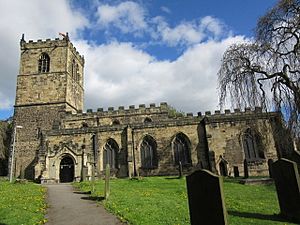All Saints Church, Darfield facts for kids
Quick facts for kids All Saints' Church, Darfield |
|
|---|---|
 |
|
| 53°32′01″N 1°22′11″W / 53.5337°N 1.3697°W | |
| OS grid reference | SE 41880 04306 |
| Location | Darfield |
| Country | England |
| Denomination | Church of England |
| Churchmanship | Broad Church |
| Architecture | |
| Heritage designation | Grade I |
| Designated | 14 October 1964 |
| Administration | |
| Parish | Darfield |
| Deanery | Wath |
| Archdeaconry | Doncaster |
| Diocese | Diocese of Sheffield |
| Province | York |
The Church of All Saints is a historic church located in the village of Darfield in South Yorkshire, England. It is a Church of England church, meaning it belongs to the main Christian church in England. This building is very important, so it is officially listed as a Grade I listed site. This means it is considered to be of exceptional historical and architectural interest.
Contents
History of the Church Building
The original parts of All Saints' Church were built a very long time ago, in the 11th century. That's over 900 years ago! Over time, more sections were added to the church in the 14th and 15th centuries. The church has also been repaired and updated several times. Major restoration work took place in 1849 and again in 1905 to keep the building in good condition.
Important People and Events
Many interesting people and events are connected to All Saints' Church. Its churchyard holds memorials to important figures and tragic events from the area's past.
Ebenezer Elliot: The Corn Law Campaigner
A famous person named Ebenezer Elliot is buried in the churchyard. He was known as the "Corn Law repeal campaigner." The Corn Laws were old laws in Britain that made food, especially bread, very expensive. Ebenezer Elliot worked hard to get these laws changed so that food would be more affordable for everyone.
Mining Disaster Memorials
The churchyard also has special monuments that remember the victims of terrible mining accidents. One memorial is for the miners who died in the 1857 mining disaster at Lundhill Colliery. Another monument remembers those who lost their lives in the 1886 disaster at Houghton Main Colliery. The memorial for the 1886 disaster was repaired and made new again in 2011. These memorials help people remember the brave miners and the dangers they faced.
The Darfield Judgement
Between 1892 and 1934, a church leader named Canon Alfred Sorby was the rector of All Saints' Church. He became famous for a legal case he won in the High Court of Justice. Canon Sorby argued that on Ascension Day, which is a special Christian holiday, children who attended a church service should not have to go to school. The court agreed with him. This important ruling became known as the 'Darfield Judgement'. It meant that children could choose to go to church instead of school on that specific day.
See also
- Grade I listed buildings in South Yorkshire
- Listed buildings in Darfield, South Yorkshire

